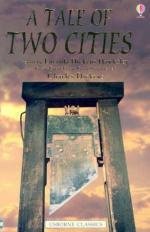|
|
A Tale of Two Cities Book 3, Chapter 4
Dr. Manette does not return until four days later. During his absence, a dreadful massacre of eleven hundred prisoners of all ages and both sexes has taken place (a fact Lucie will not learn until long after she leaves France). Dr. Manette tells Mr. Lorry in confidence that he was dragged through this scene of carnage on his way to La Force, and that in the prison setting there he found a self-appointed Tribunal, to which the prisoners were brought individually and tried. Most often, they were sent to be massacred, sometimes they were freed, and sometimes they were sent back to their cells. He tells Mr. Lorry that he appeared before this Tribunal. He identified himself as a secret and unaccused prisoner of the Bastille. He related that one of the Tribunal members had identified him, and that this man was Defarge, and that he was able to find that his son-in-law was among the imprisoned. He learned that Darnay had pleaded with the Tribunal, some members of which were murderers, for his life and liberty. Members of the Tribunal enthusiastically supported Dr. Manette upon learning of his history and agreed to his request that Darnay be brought before them and tried immediately. He was told that the prisoner would be tried soon but must be held in their custody; Dr. Manette begged to stay to ensure Charles' safety and was granted permission. Meanwhile, the doctor puts his medical skills to use and proves himself so indispensable that he becomes staff physician at three prisons, including La Force, where he can see Charles regularly and occasionally deliver letters from him to Lucie. But, while the doctor tries hard to free Darnay, the national tide is set against him. The king has been beheaded, his wife shortly thereafter, and the masses are chanting the new mantra--Liberty, Equality, Fraternity, or Death. The national fever continues to rage, the slaughter unceasing. What began as a fight against oppression has turned ugly, with innocents jailed and murdered without fair trial. And La Guillotine is talked about constantly:
"It was the popular theme for jests; it was the best cure for headache, it infallibly prevented the hair from turning grey, it imparted a particular delicacy to the complexion, it was the National Razor which shaved close: who kissed La Guillotine, looked through the little window and sneezed into the sack. It was the sign of the regeneration of the human race. It superseded the Cross. Models of it were worn on breasts from which the Cross was discarded, and it was bowed down to and believed in where the Cross was denied." Book 3, Chapter 4, pg. 271
Despite these terrors, the doctor remains confident, collected, and calm. But the forces of the revolution keep Charles in prison for another year and three months.




